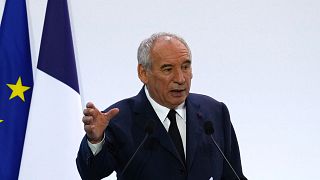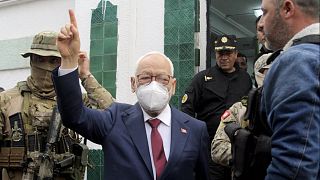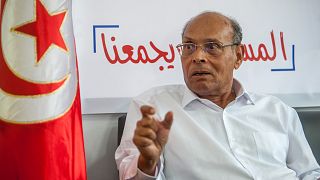Tunisia
Tunisia’s economy has been hit hard by the COVID-19 pandemic with its revenues from tourism down by over 60%.
The North African country had to order a week-long partial lockdown at the start of May due to a surge in coronavirus cases after reopening its borders to tour agencies in late April.
- 'Not scared' -
But now, with up to 10 flights a week arriving at Enfidha airport mostly from Russia and eastern Europe, this past month, Tunisia hopes to revive its tourism sector.
Andrej Radiokove, Russian tourist (male, English, 16 sec):
"Turkey closed (its borders). And we decided to come to Tunisia because it's an alternative country that is open for tourists from Russia."
While tourists from most of the West are deterred from travel by their home countries, travellers from Russia, the Czech Republic and Poland appeared to have few such qualms.
Around the pool of the Mouradi Palace, a clutch of them swayed to the rhythm of Russian electronic music.
"Customers from eastern Europe are less than reticent, less concerned about the pandemic," said Zied Maghrebi, marketing director of the nearby Movenpick hotel.
"We have fallen back on these customers because they're not afraid to travel."
Serafim Stoynovski, a 22-year-old Bulgarian law student, explained that he chose Tunisia because "restrictions here are not as strict" as in other countries.
"We can go out for a walk, go to a restaurant or have a coffee if we want," he said.
Tourists that arrive in tour groups are only required to show a negative PCR test.
Unlike other visiting travellers who must self-isolate for five to seven days in government-assigned hotels at their own expense.
As far as excursions are concerned, only select tours organised by travel agents who uphold coronavirus-prevention sanitary measures are permitted.
- Economic Revival? -
Hotels are authorised to operate at 50% of capacity but are struggling to reach that level.
The hotel normally employs at least 260 staff, but this year no more than 120 are working.
"The need to work is stronger than the fear of being contaminated," said lifeguard Aymen Abdallah, glancing at a half-empty beach in the Mediterranean resort of Sousse where Russians are making a comeback.
"If we don't work, we'll starve to death," added Abdallah, donning sunglasses and a mask.
The lifeguard is relieved to be back at work after an idle eight months. But "normally, the beach would have been full at this time," he sighed.
"There's not much profit with just 30% hotel occupancy," lamented Adel Mlayah, deputy director of the high-end Mouradi Palace in Sousse.
Adel Mlayah, the deputy director of the high-end Mouradi Palace in Sousse, outlines certain rules to be followed within the sector.
"Our hotel can reach a capacity of 1,200 guests, but because of the coronavirus pandemic that we are experiencing, the Ministry of Health forces us to not exceed a capacity of 600 guests.
"Everything is connected, if you can't work with all your capacity, we have automatically reduced the number of staff."
Tunisia sees 12,000 COVID-related deaths with only around 2% of the population vaccinated, thus far. Figures that do not seem to matter to these Eastern European tourists.
Taoufik Gaied, the Sousse tourism commissioner is hopeful to revive the tourism industry.
"We hope to have a recovery, I would say perhaps positively, that it would be the beginning of the season. We hope that it continues like that. And that the flow [of tourist arrivals, editor's note] increases from one week to the next."
He is holding out hope for one million tourists in 2021 -- still, just a fraction of the nine million who came two years ago.
The International Monetary Fund projects a GDP growth of 3.8% this year for Tunisia.A nice step forward 2020's 8.9%contraction.













00:52
Saïdia: Morocco's Blue Pearl of the Mediterranean
01:13
South Africa: Cape Town best city in the world
02:20
Descendants of enslaved Africans find connection in Ghana
11:17
Bridging the legal gap in Africa’s digital boom {Business Africa}
01:54
"Great economic potential in Africa": five African leaders have lunch with Trump
01:51
China expands visa-free travel to 74 countries, Africa left out